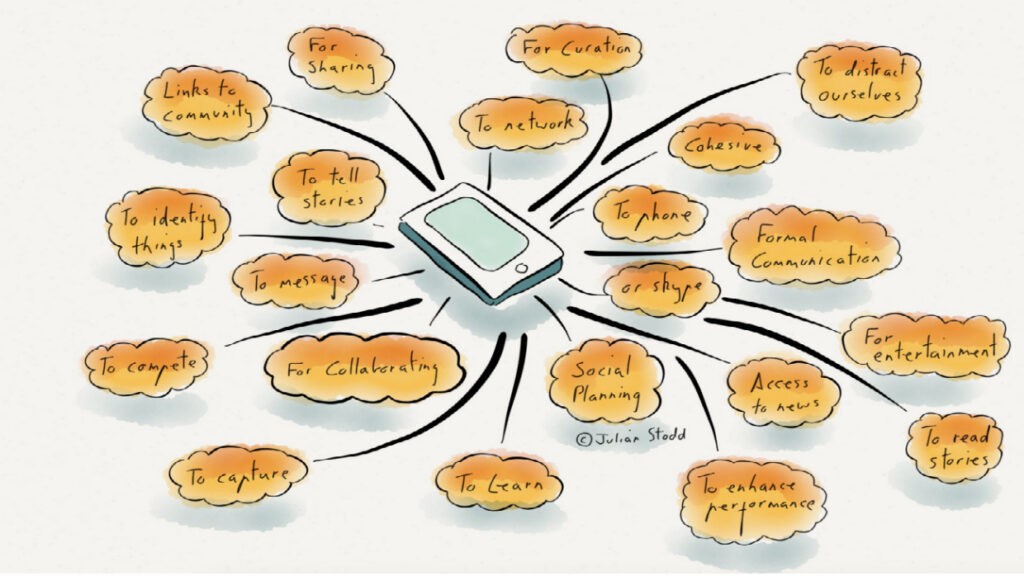The Social Age is about connections: Within networks, through technology, to communities, with each other, over time. It’s about co-created stories: Knowledge built in the moment from multiple sources and filtered through the sense-making groups we belong to. It’s more than just me, more than just you, more that just those people that we know. There are facets of connection everywhere: From how Wikipedia is generated to the ways we find dinner with Yelp. Co-created knowledge, fragments of spare thought, aligned to build our understanding of how the world is today. And how it will be tomorrow.
Many mechanisms of the modern organisation are founded upon notions of the old. They hark back to a day when we were employed throughout careers, where knowledge itself was controlled and where power lay within formal hierarchies. They are based on the premise that we must add value as defined by some all-controlling employer, on the assumption that formal hierarchy knows better than community wisdom.
And yet agility may not lie down this route. Sure, we still need control, we still need formal structures and we still need formal learning. It’s just that we also need to recognise that it’s only half of the story.
The other half is what surrounds it: Wisdom, ground truth, experience. More ephemeral, often not so easily identifiable, deeply grounded within our communities and hard to acquire except through engagement.
We are connected through technology, and yet the technology is not, in itself, connection – it’s what we say to each other that connects us, how we treat each other, support each other, challenge and enlighten each other. Technology is the mechanism by which we are connected, but communication is what it enables the connection, and communication is about people. About you, about me, about the stories that we share.
Often organisations talk about engagement, as if it’s something mysterious, sought after, elusive. Engagement is, in fact, everywhere. Or rather it’s everywhere that the terms of engagement are clear – where there is something in it for all of us, where it serves a purpose, where it’s earned. You cannot buy or bestow engagement, you can only earn it.
Those organisations stuck in the past, constrained by old models of working and older mindsets of thinking can never truly achieve engagement because they never truly want it. They never truly want what it brings – curiosity, agility, impermanence.
Curiosity to ask ‘why?’, agility to respond differently, impermanence to keep us asking those questions and to recognise that no technology, system or process will solve all our problems. Only a dynamic mindset, a humility in leadership and a curiosity in thought will do that. Only experimentation, prototyping and iteration will do that. Only by changing ourselves can we change the organisation itself, and that change comes down to connections.
So start out with permission. Create spaces for conversations and give permission for those to happen, and do it on the terms of the community, not under the control of us, the formal organisational authority.
Identify the people who engage naturally and do everything we can to support, nurture and recognise them, these are the first generations of Social Leaders, the connected strata who will form the foundations of our change community.
If we help these people tell our story, and shape the story, we may achieve greater connectivity with the story. It will spread and grow under the power of amplification, rather than brute force. That’s the key to change – connection. So our role becomes facilitating, not standing at the top and trying to force the organisation to become fit for the Social Age, but alongside it, nurturing and unleashing its natural potential. This is why I describe the agility we aspire to as a mindset rather than a process or system. Because it starts with one and multiplies to ‘us’. It starts with reflection and grows to a community, connected around ideas, around shared values.
To change our organisations, we must create spaces and permissions to connect, and recognise those people who do so, recognise them socially. Celebrate the success that they bring.
The Social Age is about connections: Within networks, through technology, to communities, with each other, over time. It’s about co-created stories: Knowledge built in the moment from multiple sources and filtered through the sense-making groups we belong to. It’s more than just me, more than just you, more that just those people that we know. There are facets of connection everywhere: From how Wikipedia is generated to the ways we find dinner with Yelp. Co-created knowledge, fragments of spare thought, aligned to build our understanding of how the world is today. And how it will be tomorrow.
Many mechanisms of the modern organisation are founded upon notions of the old. They hark back to a day when we were employed throughout careers, where knowledge itself was controlled and where power lay within formal hierarchies. They are based on the premise that we must add value as defined by some all-controlling employer, on the assumption that formal hierarchy knows better than community wisdom.
And yet agility may not lie down this route. Sure, we still need control, we still need formal structures and we still need formal learning. It’s just that we also need to recognise that it’s only half of the story.
The other half is what surrounds it: Wisdom, ground truth, experience. More ephemeral, often not so easily identifiable, deeply grounded within our communities and hard to acquire except through engagement.
We are connected through technology, and yet the technology is not, in itself, connection - it’s what we say to each other that connects us, how we treat each other, support each other, challenge and enlighten each other. Technology is the mechanism by which we are connected, but communication is what it enables the connection, and communication is about people. About you, about me, about the stories that we share.
Often organisations talk about engagement, as if it’s something mysterious, sought after, elusive. Engagement is, in fact, everywhere. Or rather it’s everywhere that the terms of engagement are clear - where there is something in it for all of us, where it serves a purpose, where it’s earned. You cannot buy or bestow engagement, you can only earn it.
Those organisations stuck in the past, constrained by old models of working and older mindsets of thinking can never truly achieve engagement because they never truly want it. They never truly want what it brings - curiosity, agility, impermanence.
Curiosity to ask 'why?', agility to respond differently, impermanence to keep us asking those questions and to recognise that no technology, system or process will solve all our problems. Only a dynamic mindset, a humility in leadership and a curiosity in thought will do that. Only experimentation, prototyping and iteration will do that. Only by changing ourselves can we change the organisation itself, and that change comes down to connections.
So start out with permission. Create spaces for conversations and give permission for those to happen, and do it on the terms of the community, not under the control of us, the formal organisational authority.
Identify the people who engage naturally and do everything we can to support, nurture and recognise them, these are the first generations of Social Leaders, the connected strata who will form the foundations of our change community.
If we help these people tell our story, and shape the story, we may achieve greater connectivity with the story. It will spread and grow under the power of amplification, rather than brute force. That’s the key to change - connection. So our role becomes facilitating, not standing at the top and trying to force the organisation to become fit for the Social Age, but alongside it, nurturing and unleashing its natural potential. This is why I describe the agility we aspire to as a mindset rather than a process or system. Because it starts with one and multiplies to 'us'. It starts with reflection and grows to a community, connected around ideas, around shared values.
To change our organisations, we must create spaces and permissions to connect, and recognise those people who do so, recognise them socially. Celebrate the success that they bring.






One Response
With the spread of mobile
With the spread of mobile technology, it’s become much easier for more people to maintain constant contact with their social networks online. However, some people think that we spend so much time maintaining superficial connections online that we aren’t dedicating enough time or effort to cultivating deeper real-life relationships.